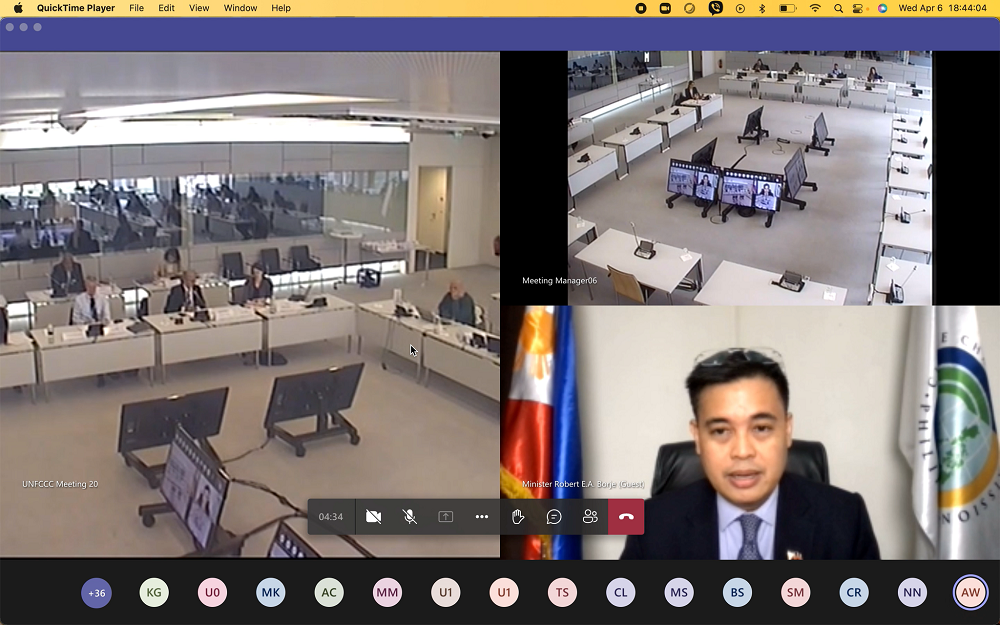
April 12, 2022 Tuesday

Climate Change Commission Secretary Robert E.A. Borje intervenes and urges the UNFCCC to streamline processes, improve modalities to access climate finance for stronger adaptive capacities of vulnerable nations. Secretary Borje delivered his virtual intervention from Manila during the Fifteenth Meeting of the Executive Committee (ExCom) of the Warsaw International Mechanism (WIM) for Loss and Damage associated with Climate Change Impacts held in Bonn, Germany.
MANILA, 12 April 2022 — Philippine Climate Change Commission (CCC) Secretary Robert E.A. Borje called on the United Nations Framework Convention on Climate Change to streamline processes and improve modalities in accessing available climate finance to strengthen the adaptive capacities of vulnerable communities to the impacts of climate change.
At the Fifteenth Meeting of the Executive Committee (ExCom) of the Warsaw International Mechanism (WIM) for Loss and Damage associated with Climate Change Impacts held in Bonn, Germany, Secretary Borje stressed the urgency of accessing climate finance, pointing out that “The window of opportunity to limit the global warming to 1.5 degrees Celsius is rapidly closing. The clock is ticking," said Borje.
Secretary Borje, in his intervention delivered virtually from Manila, stressed that vulnerable nations like the Philippines seeking vital financing support for adaptation continued to bear the weight of damages and losses resulting from climate-related disasters.
He underscored the need for “developed countries to fulfill their climate finance commitments, with limited domestic fiscal resources becoming even scarcer as developing countries deal with the impacts of climate change.”
Secretary Borje underlined that for the Philippines, climate-related disasters in the agriculture sector alone cost 0.05 percent of its Gross Domestic Product annually.
He also said that Typhoons “Rai”, “Vamco” and “Goni” caused loss and damage valued at around 1.2 billion US dollars which “represents my Government’s national health insurance funding for approximately 61 million Filipinos. That is around 56% of the Philippines total population,” adding that “the cascading impacts of loss and damage are compounded further by the COVID-19 pandemic and its burden on the country’s economy.”
Secretary Borje warned that while sound fiscal policies and an integrated pandemic response is helping the Philippines bounce back from the pandemic, the world “does not want a worst case scenario where the climate change costs will be too much for us in the developing world to bear.”
“We need urgent climate action to protect and help vulnerable countries like the Philippines improve resilience and adaptive capabilities,” said Secretary Borje.
Borje reminded the Meeting that at the core of climate adaptation and mitigation is “the principle of climate justice. To the least responsible for climate change, to those with the least resources to the most exposed, we need to do more” adding further that “More needs to be done. Together.”
On the other hand, “The Philippines will continue to do its part, with actions firmly founded on our national climate change strategy. We will proceed with strengthening our country’s anticipatory adaptation capacity through the Formulation of the National Adaptation Plan for Climate Change; Stocktaking for the National Climate Risk Management Framework towards enhanced Risk Data Governance and Information Systems; and, Adaptation Case-Building,” Secretary Borje affirmed.
He also explained that funding alone will not suffice and underlined that access must be enhanced. Financing and investments, technology and innovation, and capacity development, through inclusive multilateralism, are crucial as well.
“These tools will help vulnerable countries like the Philippines to address intensifying loss and damage from climate hazards and to implement “no-regrets” and more cost-effective climate actions,” said Secretary Borje.
In closing, Secretary Borje said that the Philippines and other developing countries must do bolder, more coherent action to minimize and avert loss and damage by connecting meaningfully with technical and financial assistance providers to unlock much-needed resources to comprehensively address these climate risks.
“Let us look at ways to streamline processes, simplify procedures, and improve the efficiencies of existing modalities. This is a huge challenge for this Committee. But the Philippines believes that no responsibility is too big nor any task too small as we continue to work together to ensure that climate justice is achieved,” he concluded.
Representatives from New Zealand, Pakistan, and the Climate Action Network commended the Philippines’ steadfast dedication to climate action.